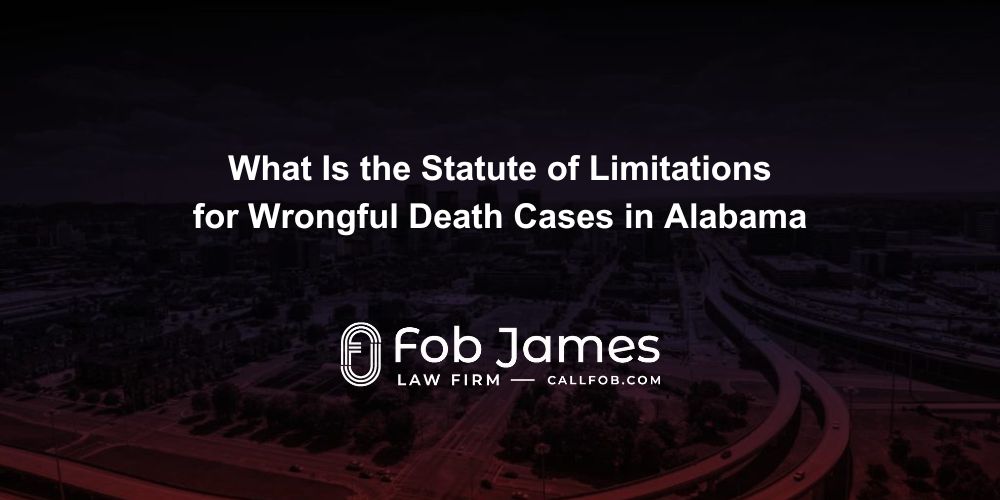
In Alabama, surviving family members may have the right to pursue legal action when a loved one dies due to another party’s wrongful actions.
Depending on the details of your case, you may be eligible to recover compensation in the form of punitive damages.
To recover compensation, an eligible party must file a civil lawsuit within the limited time allowed under state law.
Understanding the statute of limitations and how it affects your claim is critical to preserving your right to recover compensation.
What Is the Alabama Statute of Limitations for Wrongful Death?
In most cases, the Alabama wrongful death statute of limitations allows you only two years from the date of the victim’s death to take legal action in a wrongful death claim.
If a legal claim is not filed within this period, you could lose your right to pursue legal action.
There are several exceptions to the general two year rule. In some cases, you have even less time to file a lawsuit for wrongful death.
Claim Against a Municipality
If the negligent party is a municipality, you only have six months from the date of your loved one’s death to present your claim to the city clerk. [Ala. Code § 11-47-23]. Failure to present your claim to the municipality within six months case will result in your claim being time barred.
You should also be aware that in the event of a wrongful death claim against a municipality, Alabama law requires you to file a sworn statement with the municipal clerk describing:
- how the injury happened
- the date, time, and place where the injury happened, and
- the damages being claimed.
Claim Against a County
If a county government was at fault, you must present your claim within twelve months of your loved one’s death. Failure to present your claim to the county within 12 months case will result in your claim being time barred.
Tolling of the Statute of Limitations
In a very limited set of circumstances, you may be able to “stop the clock” on the statute of limitations. This is known as “tolling” the statute of limitations.
For example, if you were not aware that the negligent party caused your loved one’s death because of their fraudulent concealment, you might be able to toll the statute of limitations.
We are actually litigating a case right now where we are arguing the statute of limitations should toll. Our client was killed in a forklift accident. The defendant covered up the fact that the forklift operator was high. Due to the fraud, our argument is that the statute of limitations should start running on the date our client’s real cause of death was discovered.
Tolling is a complicated legal and facutal analysis. Talking to an attorney is the best way to help you determine the deadline for filing legal action in your case.
How to File a Wrongful Death Suit in Alabama
The process through which you must bring a wrongful death action in Alabama is highly complex and potentially confusing, especially if you are not familiar with the state’s unusual laws.
Before filing a lawsuit, Alabama law requires that a personal representative of the victim be officially designated.
The personal representative then brings legal action for the victim’s wrongful death.
Although you can undertake this process on your own, it could delay your ability to pursue a legal claim if you aren’t familiar with the process or run into many obstacles along the way.
Having an experienced attorney working on your behalf helps protect your legal rights and ensures that your claim is handled in a timely manner.
In many cases, your attorney can successfully negotiate a settlement with the at-fault party’s insurance company.
In other cases, however, you might need to pursue a civil suit, making the timeframe of your case even more critical.
How to Prove a Wrongful Death Claim
The elements of a wrongful death suit in Alabama are similar to other states across the United States.
You must demonstrate that the at-fault party’s wrongful actions caused the injury that ultimately cost your loved one their life.
To prove the elements of negligence, your attorney will investigate the circumstances of the victim’s accident and gather evidence and information to demonstrate liability.
Damages You Can Recover From A Wrongful Death Claim
In most states, a victim’s family members can pursue compensation for any actual damages they suffered as a result of their loss.
In Alabama, however, you can recover only punitive damages in a wrongful death action.
Punitive damages are intended specifically to punish the at-fault party for their wrongful actions. In addition, punitive damages are to discourage others from committing wrongful acts in similar situations.
Any damages that are awarded as a result of an Alabama wrongful death claim go directly to the victim’s heirs. The wrongful death recovery does not go to the victim’s estate.
This means that immediate family members, such as a spouse or children, will receive the compensation. It does not matter if the deceased person named others in their will.
Experienced attorneys understand how to build the most persuasive case possible. They will help you get justice for your lost loved one, and hold the at-fault party responsible for their actions.
Let an Experienced Birmingham, AL Wrongful Death Lawyer Help
At the Fob James Law Firm, our experienced wrongful death attorneys will fight to get the best possible outcome for your case.
You don’t have to face this challenging time alone.
We handle every aspect of your case, allowing you to take the time you need to grieve.
Our consultations are always free at a time convenient for you. We can meet in person or talk over video or phone.
We will evaluate your case and help you make the right choice for you, your family, and your future.
Contact us online or call 205-407-6009 for help from one of our wrongful death attorneys in Birmingham, AL.
